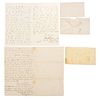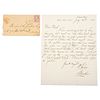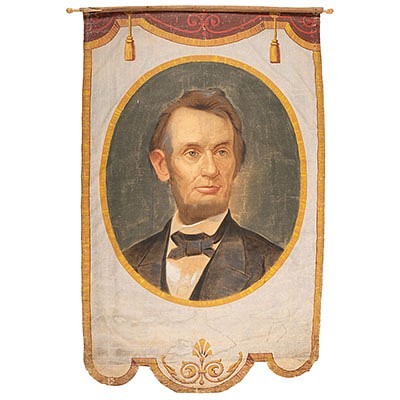[HAWKINS' ZOUAVES]. Archive of letters to and from Lieutenant Richard H. Jackson, 9th New York Volunteer Infantry, including:
About Seller
6270 Este Ave.
Cincinnati , OH 45232
United States
With offices in Cincinnati, Cleveland and Denver, Cowan’s holds over 40 auctions each year, with annual sales exceeding $16M. We reach buyers around the globe, and take pride in our reputation for integrity, customer service and great results. A full-service house, Cowan’s Auctions specializes in Am...Read more
Two ways to bid:
- Leave a max absentee bid and the platform will bid on your behalf up to your maximum bid during the live auction.
- Bid live during the auction and your bids will be submitted real-time to the auctioneer.
Bid Increments
| Price | Bid Increment |
|---|---|
| $0 | $25 |
| $500 | $50 |
| $1,000 | $100 |
| $2,000 | $250 |
| $5,000 | $500 |
| $10,000 | $1,000 |
| $20,000 | $2,500 |
| $50,000 | $5,000 |
| $100,000 | $10,000 |
About Auction
Jun 25, 2021
The June 25 American Historical Ephemera and Photography Auction features an exciting assemblage of 18th-early 20th century material, including Civil War archives, Early Photography, Western Americana, Autographs and Manuscripts, and more. Cowan's Auctions dawnie@cowans.com
- Lot Description
JACKSON, Sergeant Richard H. (1842-?). Autograph letter signed ("Richard H. Jackson"), to his friend Mr. Charles Hazeltine, Camp Butter, Newport News, Virginia, 16 June 1861. 2 pages, 5 1/4 x 9 in. (light soil, creasing at folds). Jackson writes to his friend shortly after departing New York: "On arriving I had no idea it would look so warlike trenches have been built upon which are mounted several pieces of artillery....Fort Monroe commands the entrance it is about 7 miles wide, with a spyglass you can see the secession batteries with the sentinels walking on their beats...." With cover.
[With:] FLINN, Samuel J. Autograph letter signed ("Samuel J. Flinn"), to Richard Jackson, Camp Classen, Near Frederick [MD], 17 February 1862 (erroneously written as 1861). 2pp, 5 14 x 8 1/4 in. (scattered spotting, tear along fold). Flinn, possibly a soldier of the Rhode Island 2nd Infantry, writes to Jackson noting that he is "perfectly willing to excuse you for not writing to me as I see you have been very busily engaged in fighting at Roanoke Island." Flinn continues that he hopes the troops will continue to defeat the rebels at every point, ending with a note that "I am tired of soldiering." Samuel J. Flinn of the RI 2nd Infantry deserted on 4/28/1863. With cover. -- COCHRANE, John H. Autograph letter signed ("Jno. H. Cochrane"), to Richard Jackson, 28 May 1863. 4pp, 5 x 8 in., on "Headquarters Department of Washington" stationery (creases at folds). John H. Cochrane enlisted with the NY 83rd Infantry, a regiment also known as the "Ninth Militia" or "Ninth Infantry National Guard" on 2/12/1862 as a private in NYC, also Jackson's hometown. Now a clerk in DC, Cochrane discusses the poor treatment of his regiment which was "so shamefully handled by incompetent officers, so brow beaten by all rights as a Militia regt and in fact cheated out of so many things which was guaranteed to us." Cochrane discusses being wounded at Antietam and congratulates his friend on his promotion to lieutenant. With cover and business card from "Headquarters Military Department of Washington / Office for Furloughs and Leaves of Absence." -- Additional letters include one to Jackson from "Andy" of the NY 9th, CO. A, possibly Andrew Thompson, Suffolk, VA, 17 June 1863, with news of the regiment arriving again at the front. With cover. -- Treasury Dept., 2nd Auditor's Office to Richard Jackson 10 Feb. 1864. Jackson had written on 8 February 1864 for clarification about a $100 bounty and the letter is returned with notice that Jackson was ineligible. With cover. -- Two lighthearted letters, dated 4 May 1864 and 24 July 1864, from "Charlie," a soldier and friend of Jackson working in the Ordnance Office, both with covers, one cover with handwritten notation "please Paymaster put this through, When I get paid, I'll pay you."
[Also with:] Group of 7 war-date covers, all addressed to Jackson, one from a soldier at Seminary Hospital which included a unique "calling card" featuring a female leg, "Seminary Hospital," and the name "AS Maxwell," likely sent by Alexander S. Maxwell of Co. H, NY 9th Infantry.
HDS indicates that Richard "Dick" H. Jackson (ca 1842 - ?) enlisted on 5/3/1861 at New York City as a 1st sergeant and the next day mustered into Co. I, NY 9th Infantry otherwise known as the "Hawkins' Zouves." He was commissioned second lieutenant, Co. D on October 29, 1862, transferred to Co. H in November 1862, and then to Co. A in March 1863. He mustered out with the company on 5/20/1863. During his enlistment Jackson fought in crucial engagements including at Antietam, after which his superior Col. Edgar A. Kimball in his after-action report called special attention to Jackson who was wounded in the battle. After his enlistment, Jackson was employed as a government clerk attached to the army's subsistence department. While Jackson's death date is undetermined, he does enter the historical record again in 1888 when Civil War veterans of the 9th NY led by Jackson began a correspondence with Confederate veterans of the 3rd Georgia, a regiment which the 9th repeatedly encountered during the war.
Provenance: The Civil War Collection of Dennis C. Schurr - Shipping Info
-
SHIPPING & PICKUPS Cowan’s Cincinnati Office offers an in-house, full-service shipping department which is unparalleled in the auction industry. Shipping costs are provided with your finalized invoice 24-48 hours after auction. For furniture and oversized items, we recommend using third-party services. For more information, contact cowansshipping@hindmanauctions.com. NOTE: All pickups and preview are by appointment only. To make an appointment, please call 513-871-1670 or email cincinnati@hindmanauctions.com Buyers are required to pay for all packing, shipping and insurance charges. Overseas duty charges are the responsibility of the successful Bidder. Be aware that for larger and/or valuable items, shipping charges can be substantial. - Shipping charges include insurance for your order while in transit. If you have private insurance we will adjust your charge to include only packing and shipping. - Please allow 14 – 21 days after payment to package and ship your purchase as carefully as possible.
-
- Buyer's Premium



 EUR
EUR CAD
CAD AUD
AUD GBP
GBP MXN
MXN HKD
HKD CNY
CNY MYR
MYR SEK
SEK SGD
SGD CHF
CHF THB
THB![[HAWKINS' ZOUAVES]. Archive of letters to and from Lieutenant Richard H. Jackson, 9th New York Volunteer Infantry, including:](https://s1.img.bidsquare.com/item/l/8589/8589896.jpeg?t=1LMYcF)
![[HAWKINS' ZOUAVES]. Archive of letters to and from Lieutenant Richard H. Jackson, 9th New York Volunteer Infantry, including:](https://s1.img.bidsquare.com/item/s/8589/8589896.jpeg?t=1LMYcF)












